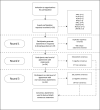Consensus on acute behavioural disturbance in the UK: a multidisciplinary modified Delphi study to determine what it is and how it should be managed
- PMID: 37739766
- PMCID: PMC10804037
- DOI: 10.1136/emermed-2023-213335
Consensus on acute behavioural disturbance in the UK: a multidisciplinary modified Delphi study to determine what it is and how it should be managed
Abstract
Background: Acute behavioural disturbance (ABD) is a term used in law enforcement and healthcare, but there is a lack of clarity regarding its meaning. Common language should be used across staff groups to support the identification, prioritisation and delivery of care to this group of patients. The terminology currently used is inconsistent and confusing. This study aimed to reach a consensus on the criteria for identification and management of ABD, and to agree when other care pathways or guidelines might be more appropriately used.
Methods: A modified Delphi study with participation from stakeholder organisation representatives was conducted in January-April 2023 online. In round 1, statements were generated by participants in response to broad questions. Participants then rated their level of agreement with statements in subsequent rounds, with statements achieving a consensus removed for inclusion in the final derived consensus statement. Non-consensus statement responses were assessed for stability.
Results: Of 430 unique statements presented for rating, 266 achieved a consensus among 30 participants representing eight stakeholder organisations. A derived consensus statement was generated from these statements. The median group response to statements which failed to achieve a consensus was reliable (Krippendorff's alpha=0·67).
Conclusions: There is a consensus across stakeholder organisations that ABD is not a separate entity to agitation, and guidance should instead be altered to address the full range of presentations of agitation. While the features of concern in this severely agitated group of patients can be described, the advice for recognition may vary depending on staff group. Criteria for recognition are provided and potential new terminology is described.
Keywords: Forensic Medicine; psychiatry; toxicology.
© Author(s) (or their employer(s)) 2024. Re-use permitted under CC BY. Published by BMJ.
Conflict of interest statement
Competing interests: CH—access to University of Edinburgh Read & Publish agreement, reimbursed for travel expenses to speak at conferences for Royal College of Emergency Medicine (RCEM), unpaid member of RCEM Toxicology advisory group, lead author of RCEM guidelines on ABD, cannabinoid hyperemesis syndrome and nitrous oxide toxicity. AW—acted as expert witness in one coroner’s inquest related to ABD in 2021, chair of UK EMS Clinical Practice Guidelines Committee, lead of committee for UK ABD guidelines for paramedic practice, chair of RCEM ABD guidelines committee, reimbursed for travel expenses to speak at 2023 RCEM conference. AK, AS and JS—none.
Figures


References
-
- Forensic Science Regulator . Guidance: the use of excited delirium as a cause of death (Issue 2). 2020. Available: https://assets.publishing.service.gov.uk/government/uploads/system/uploa... [Accessed Apr 2023].
-
- Griffin R (coroner). Regulation 28 report to prevent future deaths. 2019. Available: https://www.judiciary.uk/wp-content/uploads/2019/11/Douglas-Oak-2019-035... [Accessed Apr 2023].
-
- Faculty of Forensic & Legal Medicine . Acute behavioural disturbance (ABD): guidelines on management in police custody. 2022. Available: https://fflm.ac.uk/wp-content/uploads/2022/10/ABD-Guidelines-on-Manageme... [Accessed Apr 2023].
-
- Royal College of Emergency Medicine . Acute behavioural disturbance in emergency departments (version 2). 2022. Available: https://res.cloudinary.com/studio-republic/images/v1664186048/Acute_Beha... [Accessed Apr 2023].
-
- Police Federation England & Wales . PFEW totally refute statement on ABD by the Royal college of psychiatrists. 2021. Available: https://www.polfed.org/news/latest-news/2021/pfew-totally-refute-stateme... [Accessed Apr 2023].
Publication types
MeSH terms
LinkOut - more resources
Full Text Sources
Miscellaneous
